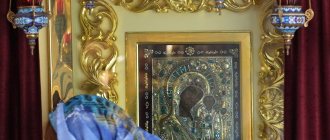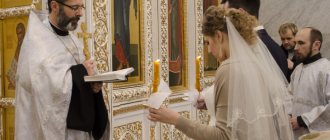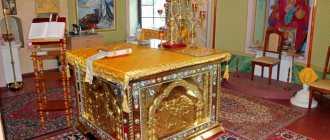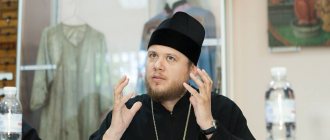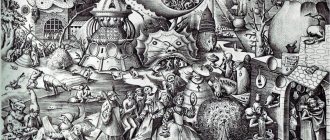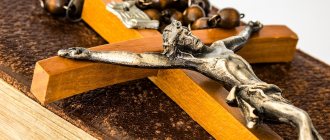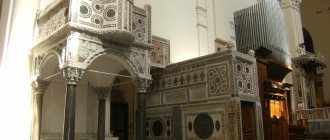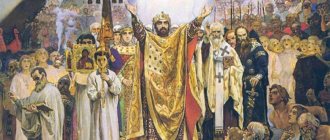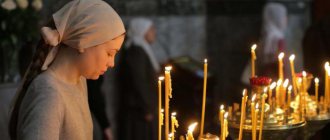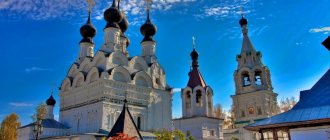Three Degrees of Service
The compiler of the book “Questions for a Priest,” Sergei Shulyak, collected in one publication the answers of Orthodox figures to the appeals of believers. For example, cleric of the Church of the Nativity of John the Baptist (St. Petersburg) Konstantin Slepinin, answering a question about the church hierarchy, also touched upon the “black” clergy. He noted that the schema is divided into small and great.
“There are three degrees of monasticism: the ryassophore, the mantle (or small schema) and the schema (or great schema). The lowest degree, the cassock, means “wearing a cassock”... The small and great schema (“form”, “image”) are the highest degrees. They are distinguished by more strict vows,” explained the clergyman.
In general, the word “schema” is translated from ancient Greek as “image”. That is, the person who accepted it seems to lose his worldly personality, symbolically giving up life. But in return, he seems to join another, higher way of being, reminiscent of an angelic existence.
It is no coincidence that, upon accepting the schema, a monk receives a new name, because his former personality no longer exists. Orthodox hermits often settled in caves, likened to coffins, in order to completely devote themselves only to serving the Almighty. Such people were revered by the people as holy elders, since a person, as a rule, comes to conscious acceptance of the great schema already in adulthood.
Now many schemamonks live in monasteries, closed off from the world in their lonely cells. They supplement the usual vows of obedience, chastity and non-covetousness for representatives of the “black” clergy with a solemn oath to completely devote themselves to spiritual affairs. Therefore, schema-monks are exempt from all duties (obediences) that ordinary monks perform at the monastery. For example, hermits do not clean rooms or prepare meals.
The clothing of the person who has taken on the “great angelic image” is also different from the clothing of other members of the brethren. In addition to the cassock, the schema-monk wears a paraman (a special scarf worn under clothes on the back and reminiscent of the cross that the monk took upon himself), a pointed cap with crosses (kukol) and a mantle.
Alienation from the world
Archbishop of Syracuse and Trinity Averky (Taushev) in 1952 became rector of the Holy Trinity Theological Seminary in Jordanville, America. He read to the students his own course of lectures, “Liturgics,” which was later published as a book. In his work, the archbishop compared the great schema with complete alienation from the world, and the monk who accepted it with a soldier of Christ.
“The following of the great angelic image is similar to the following of the small schema, but is performed with greater completeness and solemnity and is distinguished by greater severity and height of the vows given,” noted Averky (Taushev).
The procedure for tonsuring a monk into the Great Schema is called the “second baptism”, from now on this person is considered completely free from all carnal sins, becoming a symbolic son of Light. The abbot of the monastery announces to the person being tonsured that now he should feel himself crucified on the cross, thinking only about spiritual asceticism.
The schema presupposes abstinence of the flesh, poverty of bodily life, as well as great sorrow over the fate of the inhabitants of the sinful world. In addition to a reclusive life of strict fasting and asceticism, some monks voluntarily impose additional restrictions on themselves. Some observe a vow of silence, others collect rainwater in their secluded cells to drink only what the Lord gives them. Still others pray constantly, limiting their sleep time. Some people refuse food cooked over fire. They are all confident that through bodily suffering and actual mortification of the flesh a person can achieve spiritual heights.
Monasticism is the true army of Christ
Originating in Egypt in the first centuries of Christianity, monasticism found fertile soil on our land and became an integral part of Russian Orthodoxy. But it can hardly be imagined in isolation from the highest form, its crown - the great schema. What it means to be a schema-monk who has reached this highest level can be understood from the works of the holy fathers, who saw in him an image of complete alienation from everything earthly, death for the corruptible world and the beginning of eternal life.
One of the founders of monasticism, the Venerable Nil of Sorsky, gave a very apt description of all three of its stages. In his writings, he wrote that the first stage, the ryassophore, is like accepting a recruit into the army of Christ, where he must tirelessly comprehend the art of future victories. The mantle, according to him, is a performance on a military campaign, and the great schema is nothing more than a general battle, which is fought by troops brought to full combat readiness.
What is self-crucifixion
The famous Orthodox theologian Theophan the Recluse (1815-1894), in his essay “Instructions in Spiritual Life,” urged monks not to rush into accepting the schema, so as not to amuse the demons. He himself lived for a long time in a secluded cell in the Vyshenskaya hermitage of the Tambov diocese, translating and writing spiritual literature. The theologian was sure that the main idea of scheming was voluntary symbolic self-crucifixion.
“There are many crosses on the schema. This means that the schema-monk is crucified, hanging on the cross and cannot move. If you have this self-crucifixion, or you fervently desire it and are ready to do anything for it, then this will indicate that you are ready for the schema,” noted Theophan the Recluse.
Otherwise, if a monk takes on the “great angelic image,” but the idea of complete renunciation of life has not yet matured in his soul, then the angels will cry, and the demons will laugh loudly. The servants of Satan will be pleased that the schema-monk is still a slave to worldly desires and passions.
Theophan the Recluse believed that an Orthodox monk could only come to the idea of symbolic self-crucifixion over the years, after long work on himself.
Entry onto the monastic path
When a layman comes to the idea that his future path in life should pass within the walls of a monastery, he makes a request to the abbot of the monastery he has chosen, and he, if he sees no obstacles to this, gives him a chance to test his readiness to renounce everything worldly for the sake of saving his soul and gaining eternal life. Future schema-monks are people who, first of all, have deep humility, so they, regardless of their age and position in worldly life, humbly bow their heads before the need to become temporarily disciples and younger brothers of other monks.
Put on the schema from within
The acceptance of the “great angelic image” does not in any way prevent many people from studying spiritual literature, writing theological works, and also mentoring. An example of such a schema-monk is Elder Paisiy Svyatogorets (1924-1994), who lived on Mount Athos. He is equally revered in both Greece and Russia.
By the way, the author of the book “The Life of Elder Paisius the Holy Mountain” is one of his students, Hieromonk Isaac (Attalakh). He wrote that for a long time his spiritual father modestly refused to be tonsured into the Great Schema, although he fully complied with all the restrictions and vows.
“First of all, he tried to live like a monk, so as not only to formally accept the great schema, but also to be worthy of schematic grace. He attached greater importance to putting on the schema from the inside, that is, becoming a monk according to the inner man,” said Elder Paisius’ disciple.
Therefore, theologians advise the monk to first “put on the schema from the inside” (that is, to grow spiritually to the idea of renouncing the world), and only then accept the “great angelic image.” After all, any, even the most insignificant, violations of the solemn vows given to the Almighty are absolutely unacceptable, which imposes a huge responsibility on the schema-monk.
Monastic tonsure
There are three degrees of monasticism: ryassophore, mantle and schema; the first - beginners, the second - average, and the third - perfect (Venerable Macarius).
...What is a mantle? The image of humility, and we seek it out of ambition, which is why sorrow finds it. What are the vows when taking tonsure? To endure every need, insult and humble oneself, one must first be prepared for this, and not after acquiring them, but where are they? False shame that the mantle did not come out leads to madness... I see that you are only concerned about not correcting the rule: but do not grieve in the least about correcting the rule of Christian life according to the commandments of God (St. Macarius).
...There are many who mourn, not for the mantle, but also for the ryasophore; this comes from ambition - and it seems to them that from the search for salvation; salvation lies in humility, but there is none, so they grieve for the outer garment that brings honor (St. Macarius).
Have you prepared to accept the monastic image, but what is its essence and what vows did you take when taking monastic vows? not to endure everything. Paraman (an accessory of the monk's vestment of the minor schema - a small quadrangular plate with the image of a cross) and the cross mean what else if not remembering our vow to patience? So thank God that He taught you patience, and now every case should be a lesson in learning patience, and not only from external inflictions, but also from the internal evils of spirits, or to the action of passions, or to the despair of those who compel (St. Macarius) .
...Mati O. <asks> ... blessings to put on eternal mourning, then this word does not agree with true reason. Our clothes, although black in appearance, are clothes of joy and joy and a robe of salvation. Truly we must rejoice that the Lord allows us to escape the world, like Israel from Egypt, and to work for the Lord, and not for the world. So, may the Lord bless you in this robe of joy, clothe yourself with joy, and not with sadness, and do not mourn about leaving the world, but rejoice about entering into a new life, which is an understanding unknown to the people (St. Macarius).
...What is there to mourn about? About outer clothing: does it make a monk? But you want to be saved: make an internal monk, not an external one. And when we grieve over this, we move further away from salvation. Pride is alien to the monastic image; humility is akin to it (St. Macarius).
The mantle and schema have the great significance that those who receive them are given the grace to live like a monk, and the grace to fulfill monastic vows. Here the mantle and schema are similar to the weapons that are given to a warrior when he goes into battle. He has something to meet his enemies with and to defend himself and fight off from them (Venerable Barsanuphius).
When starting to accept the angelic image, go to the holy work in your mind. This is not some earthly distinction or honor, but greater humility. The image of true monasticism is sincere humility, and Saint Isaac the Syrian calls humility the garment of the Divine. Read his 53rd Word for yourself. The small angelic image is a betrothal to our Heavenly Bridegroom, Sweetest Jesus. And therefore, as soon as they dress you in this robe of humility, you will be obliged to always have the name of Jesus on your tongue, just as a betrothed bride has before her eyes a portrait of her groom (Venerable Anatoly).
Congratulations on your angelic appearance. I sincerely wish you to live purely, holyly, like an angel, in humility, obedience and unceasing prayer, in kindness and love for your neighbor (Rev. Anatoly).
One monk, left outside the monastery, began to think: “I won’t wear a rosary. I don’t pray for them, and maybe it will be my sin that I show something that is not what it is.” It is not right. Although I don’t pray the rosary, I hold it in my hand. I’ll look at them and think: “I’m a monk, I have to pray unceasingly by vow, but I don’t pray.” I reproach myself, and this is for the good... You must love monastic clothes (Venerable Nikon).
Although you did not take tonsure into the mantle, you still had a cassock, and the following prayer is read on the robe: “We thank You, O Lord our God, Who, by Thy many mercy, delivered Thy servant from the vain worldly life, and called upon her to this honest promise: grant her to live worthily in this angelic residence: and keep her from the snares of the devil, and keep her soul and body pure even to death,” and further: “garment her with sanctified clothing, gird her loins with chastity...”. From this it is clear that the Holy Orthodox Church looks at the ryassophore as a vow to God. Be afraid to lie to God. Now, if we add to this the fact that the monk in the robe is tempting you, then I’m scared to think what kind of judgment the Holy Church will pronounce on this. This is what is written in the law: a monk or nun, if they come into the communion of marriage, that is not considered marriage, but fornication, or better said, adultery... (Venerable Nikon).
They told the elder that in the Optinskaya monastery they do not give tonsure soon. To this he replied: “The internal must be observed, but there is nothing to worry about the external” (Venerable Ambrose).
Don't covet the Rassophorus. I myself was forced into a cassock and a mantle, but I didn’t want to and told Father Macarius about this - I myself would not have accepted (Venerable Ambrose).
...Read the lives of Simeon the Fool... and St. Alypius the Stylite... and pay attention to what they say about tonsure. It is good to take care of internal monasticism, but still it does not exist without external things, although external things do happen without internal ones. — All the sacraments of the Orthodox Church are performed from the combination of the external with the internal, since a person consists not of one soul, but also of a body. It’s good to prepare yourself internally for this and take your time until you get settled. “But a healthy person can reason like this, but a sick person needs to take care not to waste time, and if he doesn’t take care himself, then no one will force it on him.” — Monasticism is accepted at one’s own request, even when there is an introduction from the authorities, they will first ask and take a subscription, but then in the church they ask again: “Did you come of your own free will,” etc. It will be very high to wait until the Queen of Heaven Herself He will offer you that he wants to cut your hair, but I repeat, you should think about it and take care of it yourself (Venerable Ambrose).
...You write that you are unworthy! - It is good to humble yourself properly, and if you realize your unworthiness, then in other cases you should, in accordance with this, behave and adhere to a humble way of thinking and acting. “But because of one’s unworthiness one should not refuse to accept the monastic image. — Saint John of the Climacus writes: “Let no one call himself unworthy of being a monastic vow... Where there is great rottenness, there is a need for great healing... For health, they do not require a doctor and do not come to a doctor’s office” (Step. 1, section 19). If you don’t want to take monastic vows, then why did you enter the monastery? However, there is freedom for the free, and heaven for the saved. But if you refuse monasticism even when you are ill, then your reasoning is very erroneous, and this suggestion is clearly from the spiritual side (Venerable Ambrose).
You wonder at yourself how you decided to take monastic vows... Whatever it was, the deed has already been done, you can’t do it over; All that remains is to fulfill these vows to the best of our ability; in whatever we find ourselves wrong, let us offer sincere and humble repentance. - In no case should you be embarrassed, if only not to regret and repent that such tonsure was accepted. - This is a great gift of God, and we should not neglect even a small gift: but it is better to give thanks and try to be worthy of what has been given to us by the great mercy of God (Venerable Ambrose).
...After taking on the mantle, sorrowful temptations will be more entangled in a person, so that the skill of spiritual warfare will be created and become more skillful. Here there is no need to start thinking in a new way, why do this or that? but simply endure, humble yourself and endure again, putting your right cheek in the spiritual sense, that is, not making excuses, but accepting reproach and humiliation: firstly, for sins, secondly, because you voluntarily chose the saving path, which is called thorny, and cramped, and difficult; Especially for someone who has accepted the mantle, it is indecent to enter into other people’s affairs and give human advice on who should live where, or where to go, or even more indecent - to act with duplicity - to accept kindly to your face, but say the opposite in absentia. You must trust yourself, and the harmful person must move away, not giving free rein to the tongue and anger, self-justification, which deprive a person of spiritual benefit... (Venerable Ambrose).
And simply shearing sheep can be useful and necessary. In the spring, a sheep is shorn, and by autumn, new and harder wool grows on it. A monk will be tonsured into the robe. By autumn, that is, by old age, the disposition of his soul is already more firm and trustworthy to receive God's mercy, eternal and endless. Of course, if this spiritual sheep does not imitate goats, there is no point in climbing fences and bell towers and staggering along crossroads. Everyone knows that when a goat is not allowed to go ahead of the herd, it goes behind the herd alone, not wanting to humble itself (and for such insubordination there is neither wool nor milk from it) and go along with the others, justifying the word of Scripture: “thereby , like other men” (Luke 18:11). He does not want to heed the words of the psalmist: “Everything is good, or whatever is good, but let the brethren live together” (Ps. 133:1) (Venerable Ambrose).
...I hear about you, bossy mother, that you have not ceased to be despondent since you began to grieve when you received the news of your tonsure. Know that grief is like the sea. The more a person enters it, the more immersed he becomes. Think for yourself which warrior is safer, armed or unarmed, and which monk is stronger, tonsured or not. The tempter has a habit of perverting everything and has now begun to deceive everyone with some kind of imaginary freedom. And untimely freedom, according to the word of Saint Isaac the Syrian, leads to bitter slavery. The enemy does not want us to obey God and, according to the will of God, God’s servants, but through dark and subtle suggestions, he strives to obey him, even if not clearly or explicitly (Mr. Ambrose).
Congratulations on your tonsure into the ryassophore - this is the first degree of monasticism. I sincerely wish you to live from here on as a monk, in patience and humility, and in the fear of God, and guarding your conscience, as required by the commandments of God, starting with sincere repentance before God and your spiritual father. The beginning of beginnings is patience with the coming sorrows - to endure reproaches not only from elders, but also from younger ones, recognizing one’s faults, for which one must endure, with humility and gratitude, so that the Lord can make amends and forgive our sins (Venerable Ambrose).
...I advise you... to secretly accept the schema. See again, don’t refuse - the schema is the second baptism, cleansing and forgiving sins. If you stand up, which is however unreliable, then we will respect you, and you will humble yourself. Although you are invigorated, your illness shows and proves itself, so do not hesitate to directly accept the secret schema, which will be covered with an obvious mantle (Venerable Ambrose).
I advise you to reject and despise the thought that confuses you, that you have directly accepted the schema. I am sending you the book by Rev. Theodora Studite. In the will of the monk... you yourself can see that in ancient times the holy fathers usually tonsured directly into the schema, and the later fathers began to tonsure into the mantle first (Venerable Ambrose).
Despite the fact that you are seriously ill, you do not agree to take secret tonsure, as other seriously ill people do, for fear of not going into eternity without tonsure, having lived quite a few years in the monastery, but you want to receive a visible mantle, that is, a long one , church I don't know if you can wait for this. From the life of the Kiev-Pechersk Venerable Moses Ugrin, it is clear that he was secretly tonsured in prison by a passing hieromonk. Are you taller than this reverend? I advise you to pray to this saint of God, so that through his intercession with the Lord, he will help you get rid of mental infirmities, for the sake of which bodily illnesses are also sent. Know that desiring a visible robe for a sick person is obvious vanity. However, I do not urge you to take secret tonsure, since this work is and must be done according to the voluntary desire of those who understand it. For the monastic image is an image of repentance and humility, and not a reason for vanity and arrogance. At ordeals they will torture you greatly for simple vanity, much less for vainly wearing a long robe. It is good for the one who has great humility, and not for the one who has a long robe. The mantle is long and short, both have no sleeves, which means that the one wearing them should not do anything according to the old man, who is smoldering in the lusts of the deceitful, from which may the All-Good Lord deliver us all with His mercy (Venerable Ambrose).
I received your letter, in which you explain your bleak situation due to those who were tonsured before you, in your opinion, and less worthy. On the one hand, I feel sorry for you that you are grieving so much, but on the other hand, I consider this matter to be providential for you, so that later you would think condescendingly about those who are in a similar position and know from experience how bitter such a situation is, and sensibly think about it. I judged and reasoned about this. The Supreme Apostles were allowed temptation: Peter to renounce Christ, and Paul to persecute Christians, so that later they would be merciful to those who sin. It is in vain and unfair that you think that things are done only through people alone, without the participation of God’s Providence. In addition to the earthly authorities, there is also the Heavenly King on earth, the Holy Spirit, who governs everything, arranges what is useful for our benefit, and removes what is not useful. Hold on to this thought, and you will calm down, praying for those for whom you grieve and whom you despise (Venerable Ambrose).
